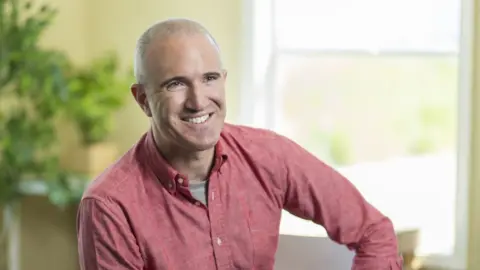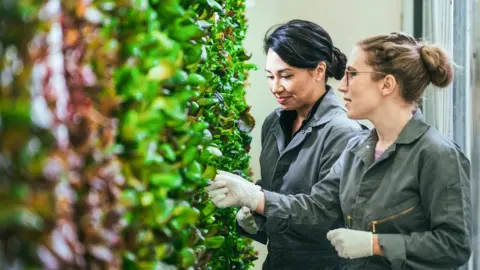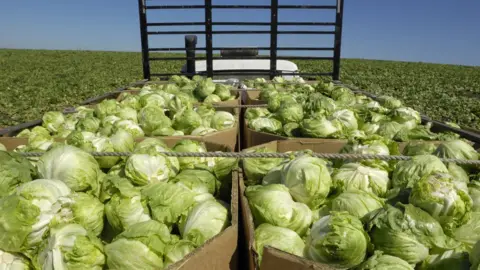Davos 2019: The man who thinks he can make us love kale
 Plenty
PlentyMatt Barnard's favourite memory of the recent Christmas holiday period was receiving a thank you letter from the 10-year-old daughter of a friend who'd been over for a meal. "I'm stunned you got me to like kale. I never knew I could like salad," she wrote.
The products had come directly from Mr Barnard's South San Francisco farm.
It's a nice anecdote. Of course, food you've grown yourself tends to be fresher and taste nicer than the same stuff from the supermarket.
But Mr Barnard's ambitions are a lot bigger than providing friends and their children with nice lunches. He is the chief executive of Plenty, a high-tech, agricultural start-up that he co-founded six years ago.
He may only have two farms currently, with a third due to open later this year, but they are test pads for a much more ambitious global expansion plan. "Plant science artificial intelligence training centres" is how he describes them.
Pole planting
The crops are grown upwards on vertical poles, enabling them to produce higher yields on much smaller areas of ground, and the farms are indoors, meaning the weather has no impact. LED lights provide the equivalent of sunshine.
The plants don't even need soil, instead they are fed by nutrient-rich water and there's no need for pesticides because there are no pests in this carefully controlled environment.
For Mr Barnard, farming is a return to the family business. He grew up on an orchard but says he never expected to work in the industry because he "didn't enjoy growing up without any control over my livelihood".
 Plenty
PlentyOn his farms it's now all about control.
The amount of water, ratio of minerals, humidity levels and different types and durations of LED light are all being varied and tested.
"By giving plants different versions of perfect environments, we have the ability to influence the way they taste," he says.
'Bowling balls'
The farms' small size means they can also be close to, or even within, big cities, dramatically reducing the distance produce needs to travel before it is eaten.
He believes that fresh produce "gets a bad rap" because most fruit and veg crops are chosen for their durability, rather than their flavour.
"Look at the iceberg lettuce. It's got no flavour and no nutrition, but it's the largest cash crop in the US because it's like a bowling ball making it resilient in the field and truck. That's what the supply chain dictates," he says.
Local farms like his are able to grow more delicate and varied types of produce because they don't need to be as robust.
"Working to produce food for people not trucks," is how Mr Barnard puts it.
High energy
He is optimistic that people will automatically choose to eat more veg if it tastes better.
Such farms could also be part of the solution to obesity and to feeding a growing global population when we're running out of space to grow crops economically, he believes.
As futuristic as it sounds, this kind of farming isn't new. There are similar companies elsewhere such as Jones Food Company in North Lincolnshire, Intelligent Growth Solutions in Scotland and the Growing Underground business in London. Internationally there are rivals such as Aerofarms in the US.
Plenty of such farms have also failed, with critics saying the high cost of the energy required to run them stops them being commercially viable.
 Getty Images
Getty ImagesMr Barnard says it's an industry that is easy to enter with off-the-shelf systems, but argues that Plenty's use of machine learning and data is what makes it different.
He says external changes, including a sharp drop in the cost of LED lighting, has also helped make it viable, with the farms more reliant on light than heat.
Reconnecting
It's easy to be sceptical, but he's been backed by some serious investors, raising $200m (£154m) from some big names, including Japanese media giant SoftBank, Alphabet's Eric Schmidt and Amazon boss Jeff Bezos in 2017.
Prof Tim Benton, an expert in food systems from the University of Leeds, agrees there is a role for companies like Plenty, but says they are unlikely to replace conventional horticulture.
"On average, if you divide global agricultural land by the number of people on the planet, each person uses a football pitch of land to crop the food we eat. Even if vertical farming stacks space high, it would be difficult to replicate even a big chunk of this space within cities. So, whilst part of the solution, it is not THE solution," he says.
But like Mr Barnard, Prof Benton agrees vertical farming is one way to reconnect people with food, "converting it from a commodity that is plastic wrapped, cheap and 'waste-able', into something real, something local, something nurtured during production".
 Plenty
PlentyPlenty's farms currently grow leafy green plants including kale, sweet lettuces and salad leaves, which require less energy compared to more substantial crops such as potatoes.
The crops are distributed via online retailers, at special events and given to a small number of consumers to trial.
Shelf life
Mr Barnard says Plenty only sells its produce when it can do so at "median organic pricing or better".
Of course, that is still much higher than rival non-organic produce, but Mr Barnard denies that his farms are simply producing tasty food for the middle class.
Lab tests have shown the produce has a longer shelf life and he says that means people will waste less, which makes it more affordable.
"Our mission is pretty ambitious. We've shown that it is possible at large scale relative to efficiency. Now we have to go about the hard work of building a business."
That's why he's here at Davos to spread the word and secure further investment for his plan.
Mr Barnard expects the business to accelerate after 2020, with expansion "likely to be outside the US".
In the end, he will judge his success on whether he manages to "meaningfully change how people think about fresh produce" as something enjoyable to eat.
So has he persuaded his own children, aged 11 and 13, to take an interest in veg?
"More and more so. Both are eating more over time," he says.
